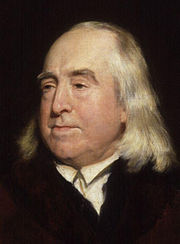Bentham begins by applying the utilitarian principle of value to art:
The utility of all these arts and sciences,—I speak both of those of amusement and curiosity,—the value which they possess, is exactly in proportion to the pleasure they yield. Every other species of preeminence which may be attempted to be established among them is altogether fanciful.Since this is the cornerstone of his philosophy, it is worth pausing to consider. Utilitarianism holds it to be rationally true that 'pleasure' (or 'happiness') is the ultimate criterion of value. While this remains a popular position with a strong case to be made for it, it is not susceptible to empirical verification (judgements of moral value being outside the province of science), regardless of whether it turns out that human pleasure can be quantified in terms of neurotransmitters. If, by 'fanciful', Bentham means 'made up', 'in the head', then utilitarianism is surely no less fanciful than any other system for determining 'preeminence'. In the case of art, common alternatives to pleasure as units of value would include truth or verisimilitude, beauty (conceived of as some objective property), and more nebulous concepts such as 'political significance' or 'spirituality'. In the absence of a higher authority, one's choice of unit is a matter of personal preference.
Next comes the crucial sentence:
Prejudice apart, the game of push-pin is of equal value with the arts and sciences of music and poetry. If the game of push-pin furnish more pleasure, it is more valuable than either. Everybody can play at push-pin: poetry and music are relished only by a few.
Push-pin was a children's game in which 'each player pushes or propels a pin with the object of crossing that of another player' (OED), which sounds like a sort of inverted pick-up sticks; the point is that it stands for the simplest and least elevated form of amusement. At first, it might seem that if one rejects the utilitarian's hedonic calculus, then there is no reason to accept this argument. However, the burden of proof is on anyone who would argue otherwise. Why should poetry – we'll leave aside music – be considered any more valuable than push-pin or its contemporary equivalents (Jenga, table football, Street Fighter IV)? A poet or critic might respond by claiming that poetry engages with 'higher' themes, is a more intellectually 'profound' activity, gets closer to the 'truth' of human nature or social reality, etc. Any of these claims would have to be worked out in much more detail; none of them is self-evidently true. Moreover, they express the natural 'prejudice' of those who have a personal investment in poetry.
With the 'relished only by a few' jibe, Bentham prefigures Bourdieu's sociology of distinction. Anyone who asserts the value of a minority pursuit over a more popular one is liable to the charge of elitism. Let us imagine a hypothetical Street Fighter addict who, after some reluctant exposure to an Archive of the Now sound clip in between rounds, says: 'This is boring, pretentious shit.' Could anyone prove him wrong? Why should they want to? A Marxist might argue that video games are part of the capitalist Spectacle, that those who play them are subject to 'false consciousness', and that 'radical' poetry might assist in removing the scales from their eyes. The problem with this argument is that it is either meaningless or obviously false to anyone who does not recognise the authority of (a particularly idealistic interpretation of) Marx. The most radical implication of Bentham's argument is its subjectivism: no single aesthetic ideology is able to claim the high ground.
At this point, though, Bentham reveals his own biases and goes on the attack:
The game of push-pin is always innocent: it were well could the same be always asserted of poetry. Indeed, between poetry and truth there is natural opposition: false morals and fictitious nature. The poet always stands in need of something false. When he pretends to lay his foundations in truth, the ornaments of his superstructure are fictions; his business consists in stimulating our passions, and exciting our prejudices. Truth, exactitude of every kind is fatal to poetry. The poet must see everything through coloured media, and strive to make every one else do the same.
This seems obviously unfair, and has the ring of an earlier puritanism about it. It is not clear why poetry should be uniquely duplicitous, at least compared to other varieties of creative or rhetorical writing. However, if we deny that 'between poetry and truth there is natural opposition', we should also concede that between poetry and truth there is no natural affiliation. If we are materialists, we must acknowledge that such truth as exists is reconcilable with an understanding of the material universe as discovered by the natural sciences, and that, while such truth can be expressed in words, the particular resources of poetry (metre, rhyme, lineation, metaphor, etc) are chiefly aesthetic, and have no inherent 'truth function' (although they may be a spur to original thought). The notion of a uniquely 'poetic truth' (i.e. one that would resist any form of translation or paraphrase) is frankly mystical.
Bentham is no particular friend to poets, then; indeed, one might well describe him as an enemy. For that very reason, though, his remarks are a useful corrective to inflationary, messianic claims for poetry's importance. Of course, the 'prejudice' that he chastises is both inevitable and necessary (a 'noble lie', perhaps?): the vitality of the Romantic movement depended on an overreaching, illusory faith in the transcendent value of art, and traces of this spirit can still be found in even the most phlegmatically relativist of corners.

No comments:
Post a Comment